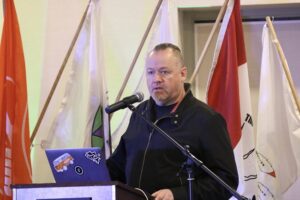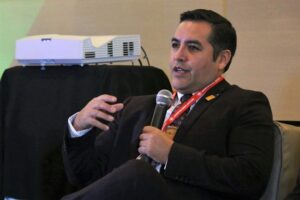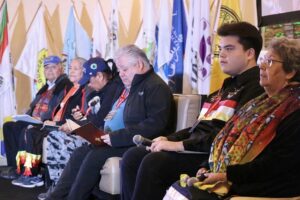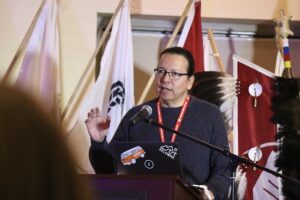In-person Economic Development, Lands and Resources Forum a success

By Kelly Anne Smith
NORTH BAY— “Look at the situation of global warming climate change. Our philosophy is needed now more than ever.”
Nipissing First Nation Ogimaa Scott McLeod spoke those words at the Economic Development, Lands and Resources Forum where First Nations from Anishinabek Nation gathered in North Bay at the Best Western from February 14 to 16.
The Economic Development, Lands and Resources Forum is a chance to collaborate on priorities regarding lands, resources, and economic sovereignty, says Anishinabek Nation Grand Council Chief Reg Niganobe. Workshops and presentations were given by Indigenous and industry experts and government representatives, with opportunities for networking to discuss challenges and successes.
Nipissing First Nation Ogimaa Scott McLeod opened the event by saying protecting the land with natural law is the Indigenous way when considering economic opportunities.
“Our laws didn’t say you can poison a lake. They said, ‘Don’t poison the lake because you have to drink the water from it.’ But their laws say, ‘You can poison the lake but only up to so many parts per million’,” he says. “If we are going to achieve guarding our resources and protecting our lands and water and animals, we have to lean toward natural law. We have to put that in the forefront. I’m not against economic opportunities, but I’m against destroying what we have in order to have an extra car in the driveway… There is a way of maintaining economic benefits but it’s through balance.”

During the Leadership Panel, Grand Council Chief Niganobe was asked about working towards reconciliation and the duty to consult while protecting the environment.
Grand Council Chief says that better engagement with government at the provincial and federal levels are needed.
“It needs to be a partnership,” he says. “Every First Nation has their own way of consulting, and you need to acknowledge that…Certain areas that they would like to protect, whether they be cultural areas or historical areas, areas of certain stories they have or where there are medicines.”
Northern Superior Regional Deputy Grand Council Chief Melvin Hardy talked of the need for a moratorium on mining claims saying it’s a drive-by system.
“We sent a letter to the Minister of NDM (Ontario Ministry of Northern Development and Mines) because of all the challenges that’s occurring – that MLAS system that they use (online registration of mining claims). There are so many claims coming in now, we don’t even have an opportunity to respond to them, but they are still moving ahead. We want the moratorium on mining so we can have a good opportunity to look at what is going on and come up with a strategic plan.”
Grand Council Chief Niganobe says the Ontario Ministry of Northern Development and Mines rejected the request for the mining moratorium.
“We have to take it back to our Chiefs in the Assembly in the spring time to look at what is going to be our response to that,” he shares. “Mining is big in our area. We don’t jump through the hoops they want us to jump… There’s actually six First Nations in the Northern Superior area in the title claim, Treaty claim non-signatories of Northern Superior… The province and the feds are a part of that. What they do is put a stop on all claims coming in for that time because there’s an area of land we are looking at. But prior to that closing, there was a big rash of claims coming in. These people come out of nowhere and we have to deal with that.”
A recent Anishinabek Nation executive meeting discussed developing a mining strategy, Regional Deputy Grand Council Chief Hardy informs.
“We are looking at a First Nation Mining Conference, to look at best practices and challenges that are occurring.”
Grand Council Chief Niganobe is hoping to engage industry. He says industry is a player within the government system of lobbying and wants to get their perspectives on issues.
“Engaging with industry because, only at this point, the government isn’t interested in this discussion; therefore they are a player in that, too. Because if they are going to develop something on First Nation land, they are actually taking the larger financial risk in actually investing in developing in First Nation land, if they are not developing that relationship with First Nations. Therefore, it’s in their best interest to be able to engage with First Nations, have a partnership with First Nations,” he says. “On the flip side, that’s not their responsibility. That’s the Crown’s responsibility that they are passing down to them. So the pressure’s there, and relaying that message to them through a mining conference and getting to know them and them getting to know First Nations issues and why we have that perspective could help in the long run.”

Lands and Resources, and Economic Development Director Jason Laronde called the forum a great success with everyone’s participation. Laronde talked about dismantling roadblocks and creating better efficiencies.
“We talk about building those relationships and empowering our First Nations. Those are our systems to help and empower,” he says. “Everyone was here from our various communities. We had people here from different regions, different First Nations that aren’t affiliated with the Anishinabek Nation. It was nice to see that. Our government partners that were here. Our Elders, we had a great session with our Elder’s panel. We heard those teachings and those discussions and wise words that we had from those Elders. That was really good and uplifting to hear some of those things. And our leadership help set the tone.”
Laronde says the forum has been so successful that the event might meld into two forums. It’s possible that a forum focused on economic development will take place in the fall with a Lands and Resources Forum happening next February.
“As we are growing our interest, we can’t pack it all in the span of two-and-a-half days in the future because there’s much to talk about.
Day 1 of the conference also heard from the Anishinabek Nation Councils Panel featuring members from the Getzidjig (Elders), Kwe-Wuk (Women’s), and Eshekenijig (Youth) Advisory Councils.

Early on Day 2, York University Assistant History Professor Alan Corbiere of M’Chigeeng First Nation gave an in-depth Wampum Belt Teaching; and other topics included data sovereignty, First Nations taxes, Ontario Ministry updates, and agriculture. Late Day 2, Kristy Sayers, Energy Advisor for Garden River First Nation, explained how her community is successfully moving to solar energy for savings.
The 2023 Economic Development and Lands & Resources Forum can be viewed here.


